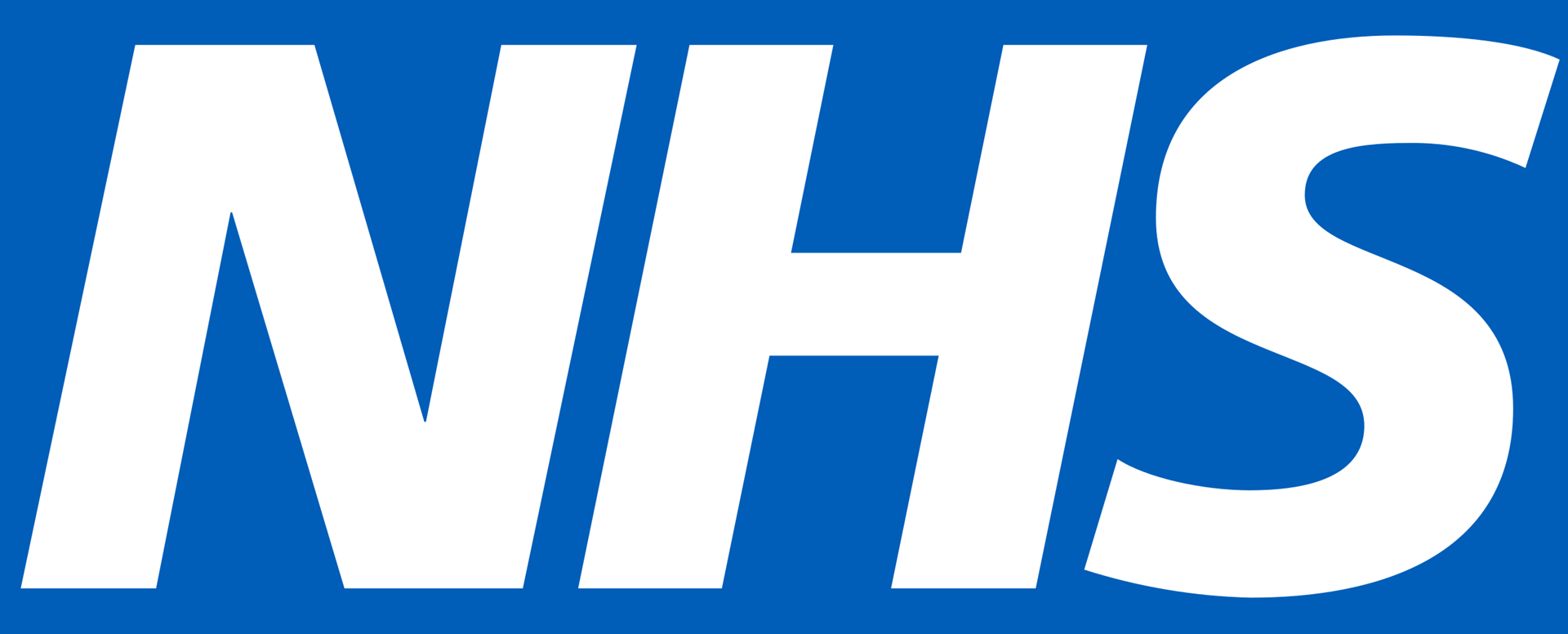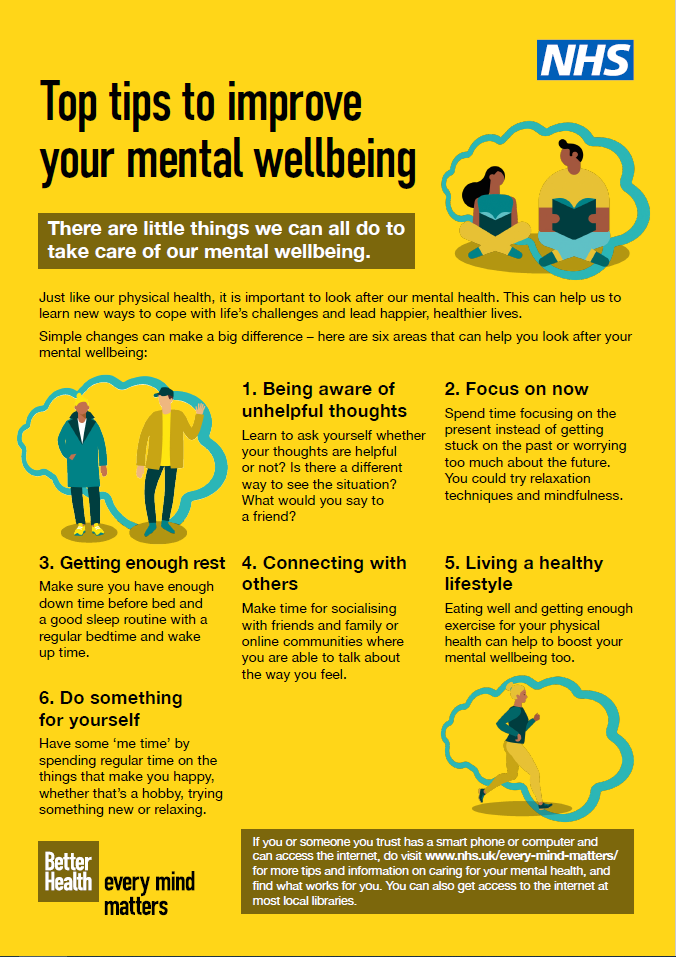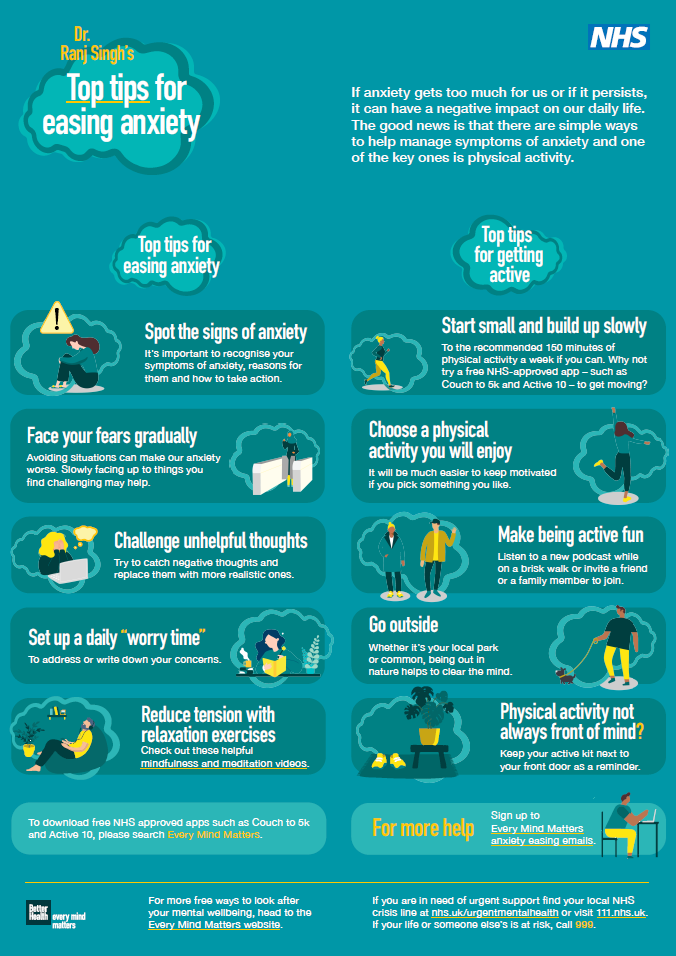There are a wide range of self-help resources available. Find tips, guides, tools and activities to support and improve mental health here or on the NHS website.
Mental Health
Self-Help
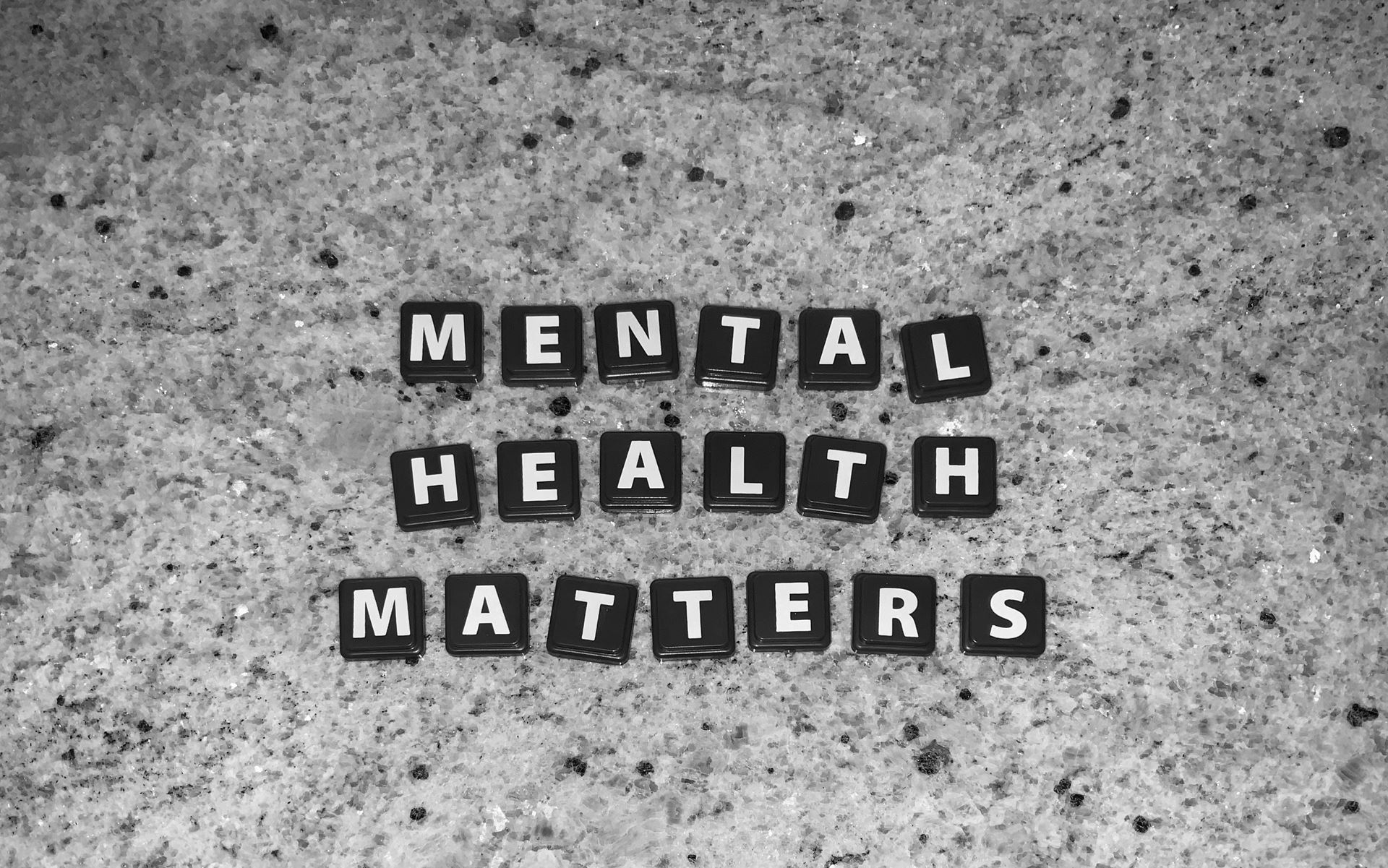
Advice for Parents
Support and advice for helping your child with exam stress, coping with arguments, dealing with depression, supporting them through bereavement, anxiety and anger issues as well as how to talk to your child about their feelings.
Advice for parents - NHS (www.nhs.uk)
This May Help also provides practical advice for supporting your child's menetal health.
5 steps to Mental Wellbeing
Evidence suggests there are 5 steps you can take to improve your mental health and wellbeing. Trying these things could help you feel more positive and able to get the most out of life.
- Connect with other people
- Be physically active
- Learn new skills
- Give to others
- Pay attention to the present moment (mindfulness)
Visit 5 Ways to Wellbeing | Mind to find out more
Reading Well
You can find books for common mental health problems like anxiety and depression on the Reading Well website.
These books are all recommended by NHS health professionals and people living with the health problems covered in the books.
Reading Well books are available free from local libraries. Visit Local library services - GOV.UK (www.gov.uk) to find out how to join the library and access books electronically.
Overcoming
The Overcoming website offers books as well as content you can download and apps covering more than 30 common mental health problems like anxiety, low self-esteem and grief.
Some of its titles are recommended by Reading Well.
The books are available from bookshops, libraries and online stores.

Urgent Mental Health Care
If there is immediate danger to yourself or someone else, please call 999 or go to A&E.
If you or someone else needs urgent help for mental health, but it is not an emergency, please call 111 or use NHS 111 online.
For 24-hour mental health advice and support for people of any age, please follow this link for NHS urgent mental health helplines.
Help is available 24/7 from the Avon and Wiltshire Mental Health Partnership NHS Trust, reachable on 0800 953 1919.

Did you know? In Buddhist and Taoist symbolism, the lotus represents human beings' true nature of resilience and the ability to overcome adversity, because its blossoms emerge pure and beautiful from muddy waters.
Feeling Stressed?
If you're stressed, whether by your job or something more personal, the first step to feeling better is to identify the cause.
The most unhelpful thing you can do is turn to something unhealthy to help you cope, such as smoking or drinking.
Not taking control of the situation and doing nothing can make your problems worse.
Some of the keys to good stress management are building emotional strength, being in control of your situation, having a good social network and adopting a positive outlook.
Mental Health for Young People
Mental health advice and support specifically for children, teenagers, young people and parents can be found here.
Find information on the support and services available as well as how to access help and how to be referred.
Please also check This May Help's website for practical advice on supporting your child's mental health .
Medicine and Psychiatry
As well as therapies, medication can also be used to treat mental health conditions.
A list of the most common medications and further information on them can be found here.
For information on stopping or coming off medication, please follow this link and speak with your GP.
Psychiatry may be available with a referral from your GP or another doctor.
Most psychiatrists work as part of a community mental health teams (CMHTs), in out-patient clinics or in hospital wards.
Local Services and Charities
There are a number of local mental health services and charities available across the UK.
Local services can be found with this link, from your GP to council services to your local pharmacy.
Mental health support available from Wiltshire Council can be found here.
You can find information on local mental health charties by visiting the Hub of Hope website, which is run by the national charity Chasing the Stigma.
Every Mind Matters
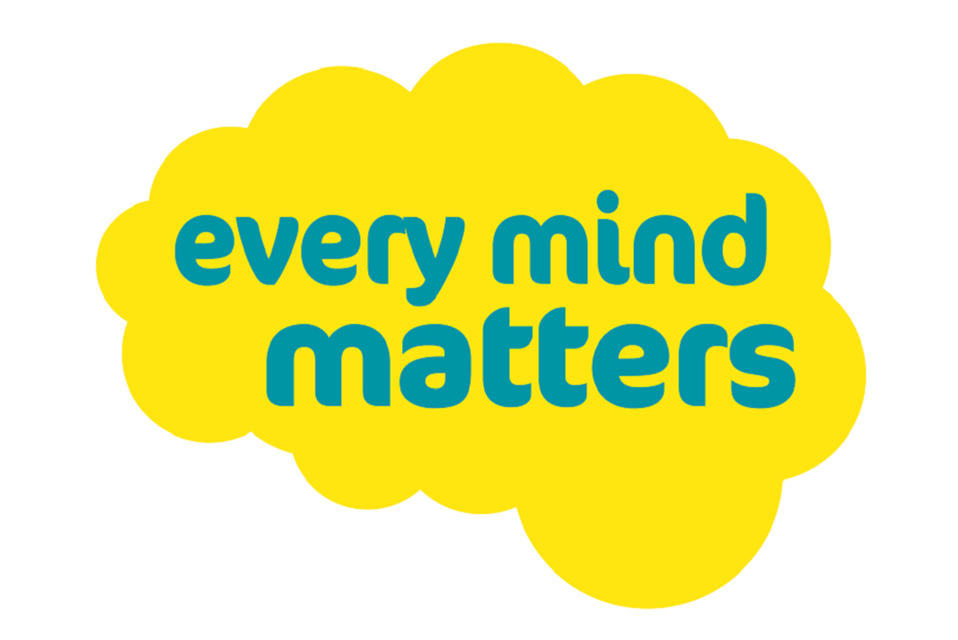
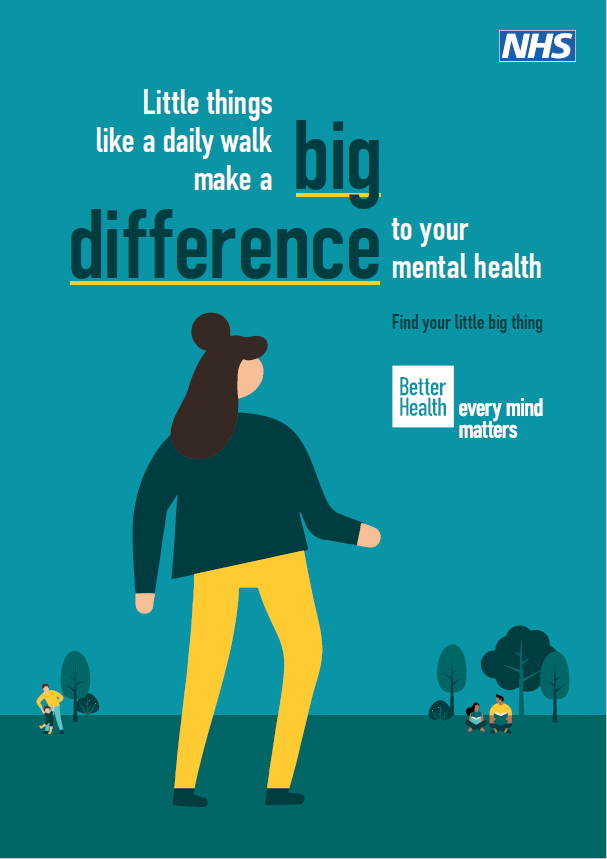
Little Big Thing
The Every Mind Matters campaign encourages and helps us to ‘find your little big thing’ hero-ing the little things we can do, which can make a big difference to our mental health.
Making time for your mental wellbeing is important - and embedding these little things as part of your routine can help you feel better and more in control. These little things can include:
- Getting physically active – like taking a walk
- Managing your thoughts and feelings with the help of CBT
- Talking to someone you trust
- Getting the most from your sleep – like avoiding screen-time an hour before bed or getting out of bed and doing something simple until you feel tired again
- Getting closer to nature
- Planning something nice to look forward to
Little things like a daily walk or a regular chat can make a big difference to your mental health.
NHS Therapy and Counselling Services
NHS talking therapy services are available to people in England aged 18 years or over.
You can be referred by your GP or you can refer yourself.
NHS talking therapies services offer:
- talking therapies, such as cognitive behavioural therapy (CBT), counselling, other therapies, and guided self-help
- help for common mental health problems, like anxiety and depression
Talking therapies can be used to treat conditions such as:
- depression
- generalized anxiety
- social anxiety
- panic and agoraphobia
- other phobias
- obsessive-compulsive disorder (OCD)
- post-traumatic stress disorder (PTSD)
- irritable bowel syndrome (IBS)
- body dysmorphic disorder
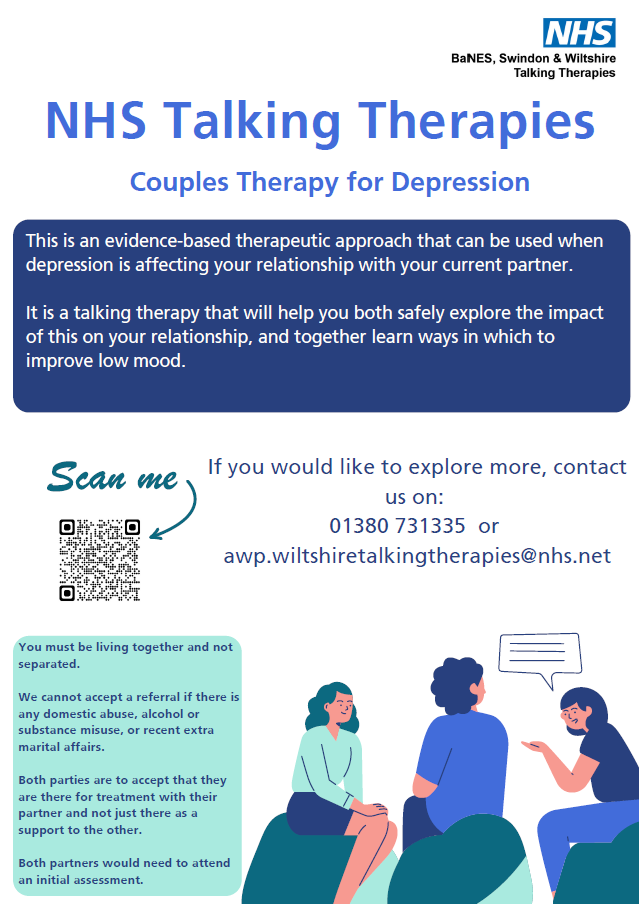
Additional Resources

They run organised hikes and fundraisers throughout the year that goes into supporting much needed help for people who are on long waiting lists for counselling or therapy.

A charity that gives advice and support to empower anyone experiencing mental health problems. They campaign to improve services, raise awareness and promote understanding.
Page created: 26 February 2021
